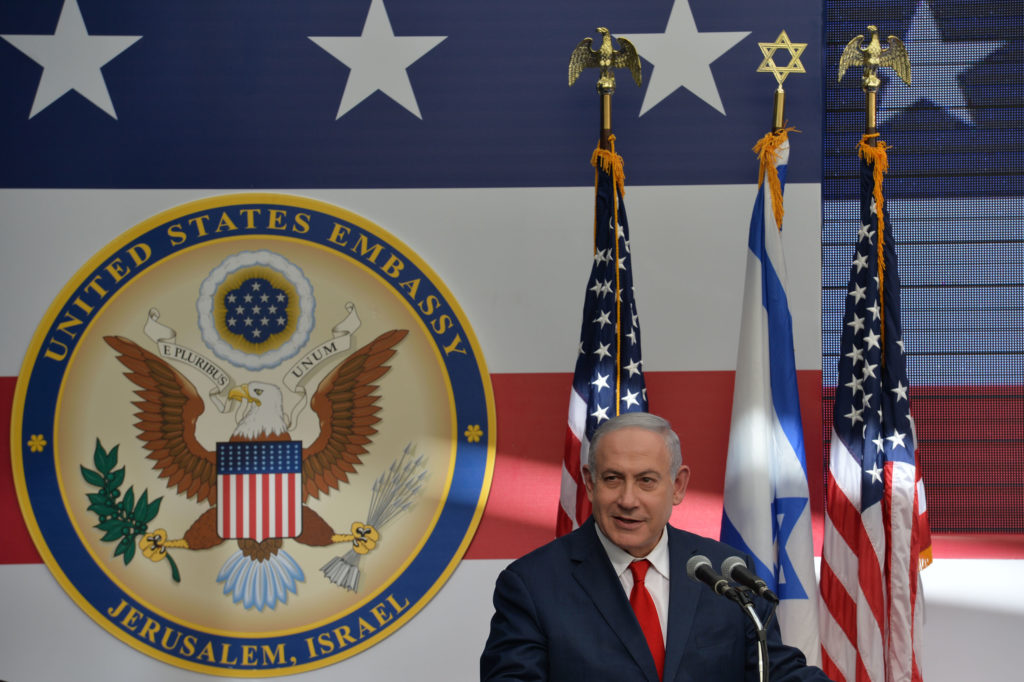
The Israeli cabinet formally and unanimously rejected an internationally-imposed Palestinian state on Sunday, calling such a state a “reward to terrorism”. Hours later, the United States clarified their own position on the matter, with US Ambassador to Israel Jack Lew saying the US “never said there should be a unilateral recognition of a Palestinian state,” according to a report in The Times of Israel.
Nonetheless, Lew also made it clear the US is looking ahead towards an “over the horizon process that includes a vision for a demilitarized Palestinian state.” Earlier that day, Israel made their own position clear.
“Israel utterly rejects international diktats regarding a permanent settlement with the Palestinians. A settlement, if it is to be reached, will come about solely through direct negotiations between the parties, without preconditions,” said the unanimous Israeli cabinet declaration, which represents 76 of the 120 seats in the Israeli parliament (Knesset). “Israel will continue to oppose unilateral recognition of a Palestinian state. Such recognition in the wake of the October 7th massacre would be a massive and unprecedented reward to terrorism and would prevent any future peace settlement.”
Meanwhile, Lew’s apparent dismissing of unilateral Palestinian statehood came during a question-and-answer session following a speech on Sunday to the Conference of Presidents of Major American Jewish Organizations in Jerusalem. During the speech itself, Lew nonetheless outlined a Palestinian statehood scenario.
“Arab countries who joined the Abraham Accords, and those who wish to establish normal relations with Israel, will be key both to reforming the Palestinian Authority and to the economic revitalization that will need to follow this war. Their involvement also depends on the addressing the aspirations of Palestinians for a better future,” said Lew, whose comments were posted to the US Embassy to Israel website.
“Underscoring everything is that Israel must be secure. This means that Israel must be responsible for defending itself, and there cannot be a militarized Palestinian state. At the same time, if the normalization conversation with Saudi Arabia is to be achieved, there must be an over the horizon process that includes a vision for a demilitarized Palestinian state.”
Lew’s comments followed a report by Axios last week that the US was exploring various options that could include some form of unilateral Palestinian statehood declaration—either by the US itself, or by the US refraining from vetoing the United Nations Security Council admitting a State of Palestine to the UN. Per the report, the US was considering possibilities and had not made a policy decision; the discussion had also received strong push back from Israeli Prime Minister Benjamin Netanyahu.
Netanyahu isn’t the only one troubled by the proposal. Even stronger rhetoric came from Israeli legislator and rival to Netanyahu, Gideon Sa’ar, a member of the National Union party that left the opposition to join the emergency national government after the October 7 massacre in which Hamas murdered 1,200 Israelis and kidnapped hundreds more. Sa’ar, per a Google translation of a post on his official page on X (formally Twitter), compared it to rewarding Al Qaeda after the September 11 attacks.
Sa’ar on Sunday posted that he “welcomes the government’s unanimous decision, which expresses a comprehensive and aggressive national front, against the moves seeking unilateral international recognition of a Palestinian state. The establishment of a Palestinian state after 7.10.23 is no less absurd than a proposal to establish a state for Al Qaeda after the attacks of 11.9.01. National unity is as important in the political campaign as in the military one.”
For his part, Ambassador Lew on Sunday said in his speech that “any decisions on the future will be made by the people of Israel and its elected leaders. We have shown our commitment to Israel prevailing on the battlefield. We offer our vision of a better future, and our efforts to achieve it, as another expression of the deep bonds between our two nations and people.”
If that vision were to align with the reports in the media of a potential unilateral recognition of Palestinian statehood by the US, a former US Ambassador to Israel has already voiced his strong opposition. David Friedman, in a post to X on February 15, wrote: “Biden’s Middle East policy in a nutshell: Palestinian terrorists kidnap, murder and rape Israelis, then agree to give back some of the hostages that are still alive in exchange for many more terrorists held in Israeli prisons—and as a reward they get an independent state! Sorry Mr. President, peace through weakness is not peace at all and only leads to more violence and misery. All people of good faith must oppose this Biden agenda now being reported in the media.”
(By Joshua Spurlock, www.themideastupdate.com, February 18, 2024)
